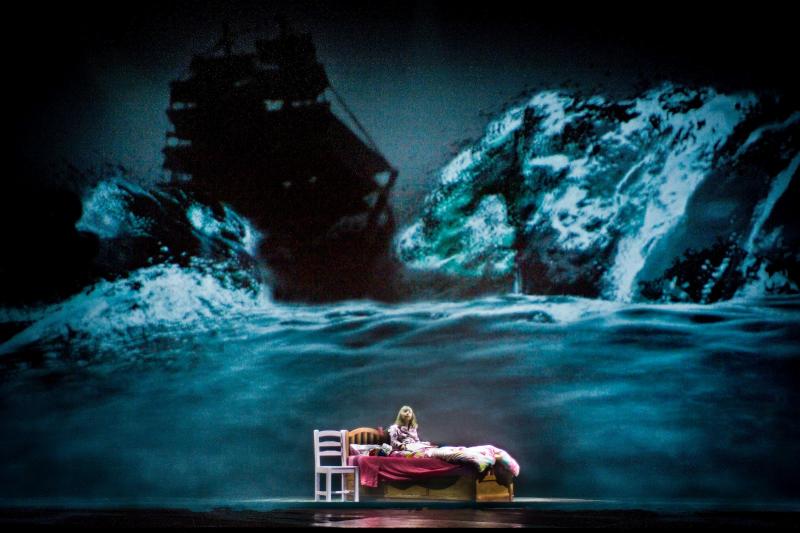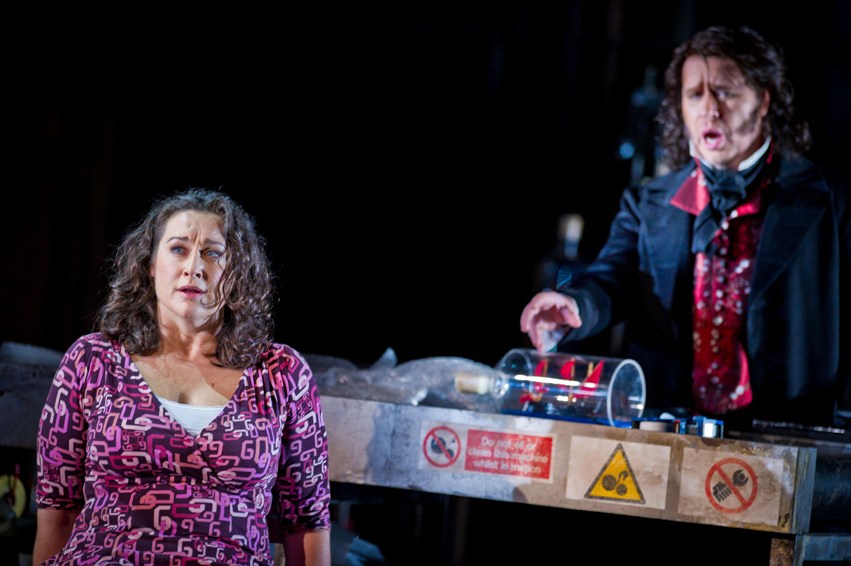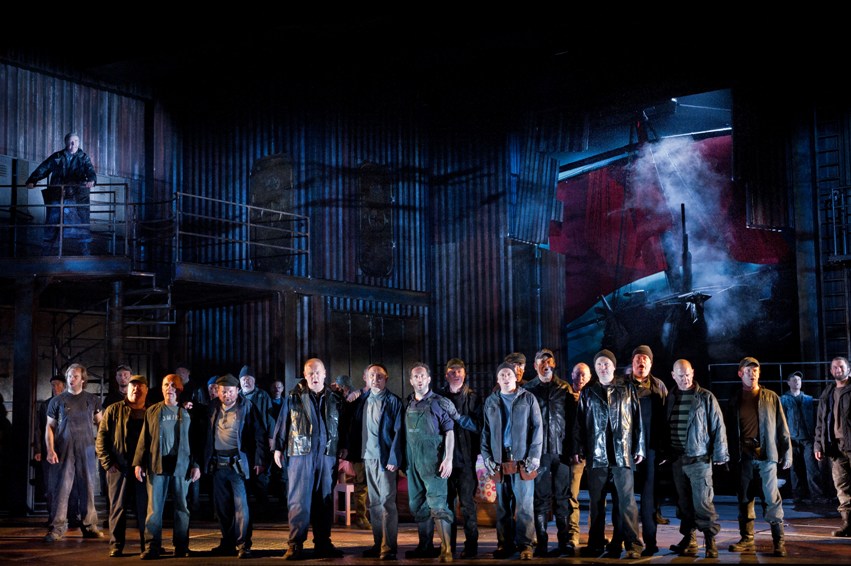The Flying Dutchman, English National Opera | reviews, news & interviews
The Flying Dutchman, English National Opera
The Flying Dutchman, English National Opera
An obsessive and redemptive new Dutchman from Jonathan Kent

Obsession and redemption, the twin themes of Wagner's ghostly earliest masterpiece, are two words that could just as pertinently be applied to Jonathan Kent's new production for English National Opera. Obsession is how many non-diehard Wagner opera-goers will view Kent's decision to stage this opera as a continuous pieceit' of drama with no interval. Sure, Wagner originally considered a single-act work, but he quickly dropped the idea.
However, thankfully, last night there was also redemption, because after 30 seconds of the overture it was clear that, despite the prospect of over two hours in our seats, this wasn't going to be a clock-watching endurance challenge of an evening. In fact, quite the opposite.
 Kent's production sets the action in a loosely modern setting, Daland's ship a massive cargo vessel, all corrugated metal and rusting pipes. At the centre of this harsh adult sea environment is an Ikea-like bed bedecked with a childish pink duvet, in which Senta the child (Aoife Checkland), repeatedly fobbed off by her father, takes solace from her book of tales about the flying Dutchman, feeding the obsession that will eventually kill her. However, just as you've got your historical bearings, in crashes the Dutchman's tall-masted sailing ship, rigging and all, whilst American bass James Creswell's Dutchman rises up into Senta's (now empty) bed, complete with Victorian side-burns and tailcoats, and a good century and a half's worth of bitterness on his face. Suddenly, this feels like a serious ghost story.
Kent's production sets the action in a loosely modern setting, Daland's ship a massive cargo vessel, all corrugated metal and rusting pipes. At the centre of this harsh adult sea environment is an Ikea-like bed bedecked with a childish pink duvet, in which Senta the child (Aoife Checkland), repeatedly fobbed off by her father, takes solace from her book of tales about the flying Dutchman, feeding the obsession that will eventually kill her. However, just as you've got your historical bearings, in crashes the Dutchman's tall-masted sailing ship, rigging and all, whilst American bass James Creswell's Dutchman rises up into Senta's (now empty) bed, complete with Victorian side-burns and tailcoats, and a good century and a half's worth of bitterness on his face. Suddenly, this feels like a serious ghost story.
Watch the trailer for the ENO's production of The Flying Dutchman
Meanwhile, the singers match superb vocal performances with such convincing acting that the production also feels like a proper drama, rather than like a bunch of opera singers walking through their stage directions. Cresswell, and Orla Boylan as Senta (pictured above), are an electric pairing, and individually captivating. The subdued power in Cresswell's tone as he utters his opening, “The time is up”, is spine-chilling, and its later full-throttled eruption fulfils all the initial promise.
Orla Boylan sings a glorious, clear-voiced Senta, by turns ecstatically pure and almost gratingly piercing as the drama requires. She has absolute mastery over her taxing vocal lines and high notes. Her characterisation of this vulnerable, disconnected, bewitched woman come together in her tension-riven Ballade, its surface calm barely keeping at bay the schizophrenic jostle beneath between aggression and tenderness. Stuart Skelton lends dignity to the impotent Erik by the sheer poised beauty of his performance, Robert Murray's aria as the Steersman is true-voiced and tender, and the gentlemen of the ENO chorus (pictured below) have never sounded so good or lifted the roof so high.
 The real star of the night, though, was musical director Edward Gardner. This was his first Wagner opera as conductor, and he absolutely smashed it. An edge-of-the-seat orchestral adventure ride from the first note, with tempi on the faster side of the spectrum, Gardner's interpretation crackled and smouldered with devilish fire through the many gear-changes in mood and pace. Such was the orchestra's dramatic power that there was a sense of the instrumentalists in the pit being not just the accompaniment, but also narrator and Greek chorus all rolled into one.
The real star of the night, though, was musical director Edward Gardner. This was his first Wagner opera as conductor, and he absolutely smashed it. An edge-of-the-seat orchestral adventure ride from the first note, with tempi on the faster side of the spectrum, Gardner's interpretation crackled and smouldered with devilish fire through the many gear-changes in mood and pace. Such was the orchestra's dramatic power that there was a sense of the instrumentalists in the pit being not just the accompaniment, but also narrator and Greek chorus all rolled into one.
It wasn't all perfect. Early on, there were a few balance issues between orchestra and soloists. Later, the Act Three trio between Erik, Senta and the Dutchman felt strangely static and awkward. Even more awkward was the segue between Acts Two and Three, which saw Senta engaged in a bizarre slow dance with a hitherto unintroduced member of the Dutchman's crew. Still, these are small gripes. This is one to grab a ticket for.
- The Flying Dutchman at the London Coliseum until 23 May
Add comment
The future of Arts Journalism
You can stop theartsdesk.com closing!
We urgently need financing to survive. Our fundraising drive has thus far raised £49,000 but we need to reach £100,000 or we will be forced to close. Please contribute here: https://gofund.me/c3f6033d
And if you can forward this information to anyone who might assist, we’d be grateful.

Subscribe to theartsdesk.com
Thank you for continuing to read our work on theartsdesk.com. For unlimited access to every article in its entirety, including our archive of more than 15,000 pieces, we're asking for £5 per month or £40 per year. We feel it's a very good deal, and hope you do too.
To take a subscription now simply click here.
And if you're looking for that extra gift for a friend or family member, why not treat them to a theartsdesk.com gift subscription?
more Opera
 Albert Herring, English National Opera review - a great comedy with depths fully realised
Britten’s delight was never made for the Coliseum, but it works on its first outing there
Albert Herring, English National Opera review - a great comedy with depths fully realised
Britten’s delight was never made for the Coliseum, but it works on its first outing there
 Carmen, English National Opera review - not quite dangerous
Hopes for Niamh O’Sullivan only partly fulfilled, though much good singing throughout
Carmen, English National Opera review - not quite dangerous
Hopes for Niamh O’Sullivan only partly fulfilled, though much good singing throughout
 Giustino, Linbury Theatre review - a stylish account of a slight opera
Gods, mortals and monsters do battle in Handel's charming drama
Giustino, Linbury Theatre review - a stylish account of a slight opera
Gods, mortals and monsters do battle in Handel's charming drama
 Susanna, Opera North review - hybrid staging of a Handel oratorio
Dance and signing complement outstanding singing in a story of virtue rewarded
Susanna, Opera North review - hybrid staging of a Handel oratorio
Dance and signing complement outstanding singing in a story of virtue rewarded
 Ariodante, Opéra Garnier, Paris review - a blast of Baroque beauty
A near-perfect night at the opera
Ariodante, Opéra Garnier, Paris review - a blast of Baroque beauty
A near-perfect night at the opera
 Cinderella/La Cenerentola, English National Opera review - the truth behind the tinsel
Appealing performances cut through hyperactive stagecraft
Cinderella/La Cenerentola, English National Opera review - the truth behind the tinsel
Appealing performances cut through hyperactive stagecraft
 Tosca, Royal Opera review - Ailyn Pérez steps in as the most vivid of divas
Jakub Hrůša’s multicoloured Puccini last night found a soprano to match
Tosca, Royal Opera review - Ailyn Pérez steps in as the most vivid of divas
Jakub Hrůša’s multicoloured Puccini last night found a soprano to match
 Tosca, Welsh National Opera review - a great company reduced to brilliance
The old warhorse made special by the basics
Tosca, Welsh National Opera review - a great company reduced to brilliance
The old warhorse made special by the basics
 BBC Proms: The Marriage of Figaro, Glyndebourne Festival review - merriment and menace
Strong Proms transfer for a robust and affecting show
BBC Proms: The Marriage of Figaro, Glyndebourne Festival review - merriment and menace
Strong Proms transfer for a robust and affecting show
 BBC Proms: Suor Angelica, LSO, Pappano review - earthly passion, heavenly grief
A Sister to remember blesses Puccini's convent tragedy
BBC Proms: Suor Angelica, LSO, Pappano review - earthly passion, heavenly grief
A Sister to remember blesses Puccini's convent tragedy
 Orpheus and Eurydice, Opera Queensland/SCO, Edinburgh International Festival 2025 review - dazzling, but distracting
Eye-popping acrobatics don’t always assist in Gluck’s quest for operatic truth
Orpheus and Eurydice, Opera Queensland/SCO, Edinburgh International Festival 2025 review - dazzling, but distracting
Eye-popping acrobatics don’t always assist in Gluck’s quest for operatic truth
 MARS, Irish National Opera review - silly space oddity with fun stretches
Cast, orchestra and production give Jennifer Walshe’s bold collage their all
MARS, Irish National Opera review - silly space oddity with fun stretches
Cast, orchestra and production give Jennifer Walshe’s bold collage their all

Comments
I suspect this reviewer has
I suspect this reviewer has not heard many performances of this opera? Am I right? The same set from 'Sweeney Todd' and 'borrowings' from other 'Dutchman'/Wagner etc. productions down the years ... 'Senta's Dream' is not original and the wild revels at the end were a version of something directed by David McVIcar. The music and singing was mostly that of 'Dutchman' as if it was a lost Verdi opera ... a 'numbers' rum-ti-tum piece devoid of much that is Wagner. This summer I will need Thielemann at Bayreuth to erase the memory of this. It will be all be praised because most people in the UK have forgotten what Wagner should sound like ... I suspect the staging and singing would get a much less favourable reception across the rest of Europe who still know their Wagner. The cheap seats at the Coliseum were not soldout and I wonder what the audience will be like for the rest of the run - the ENO seems to have lost its core audience of regulars and must now rely on good word of mouth (such as this tries to do) for its box office receipts.
No-one with respect for
I went to see the Flying
Joseph Alder has a very
It seems as if I saw a
I'm amazed at this negative
Well said Lindsay ... I am